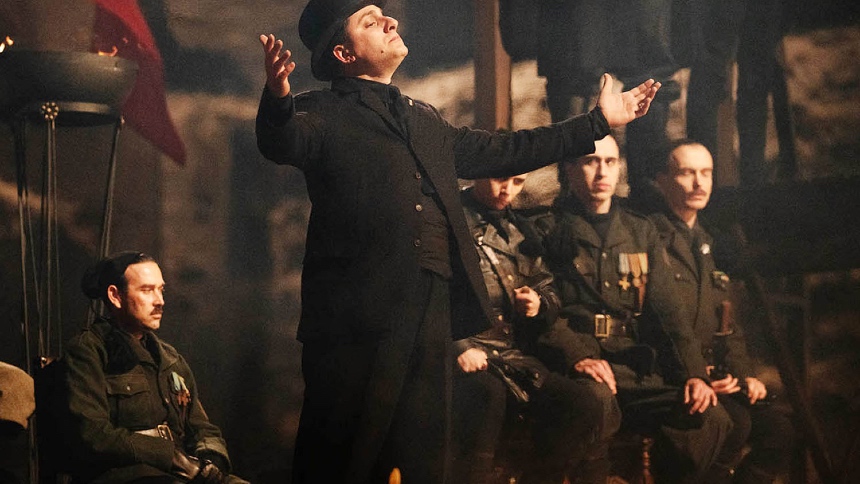Series Mania 2025 Review: MUSSOLINI: SON OF THE CENTURY, Fascism as a Burlesque Theatre
Director Joe Wright gives his Mussolini biopic a 'Les Miz' treatment in a burlesque political miniseries about the rise of fascism.

Amid growing concerns over the resurgence of authoritarianism, Joe Wright returns to a historical turning point, examining the early political career of Benito Amilcare Andrea Mussolini.
Mussolini: Son of the Century, an Italian-language miniseries, offers a revisionist perspective on the rise of Italian fascism, tracing Mussolini’s transformation from a socialist newspaper editor to a central figure in the establishment of fascist ideology during the 1920s. Spanning a decade marked by political charisma and ideological erosion, the series depicts the rise of fasciasm in a theatrical fashion.
Wright, whose career has spanned adaptations of literary romanticism and political biography, approaches Mussolini’s rise, not with the biogrpahic approach of the latter but through a flamboyant makeover that blends political burlesque with theatrical excess. The series incorporates Brechtian monologues, musical interludes, archival footage, and over-aestheticized transgressive violence.
Mussolini: Son of the Century is a biographical miniseries about the ascent of fascism but with a Les Misérables treatement. Its mise-en-scène is deliberately heightened marked by elaborate set design, anachronistic musical choices, and frequent fourth-wall breaking flourishes.
Wright adopts a tone similar to recent irreverent biopic series, such as The Great or Dickinson, though filtered through a music video aesthetic. Working from Antonio Scurati’s novel M: Son of the Century, adapted in collaboration with screenwriters Stefano Bises and Davide Serino, Wright ventures into ethically fraught territory by framing Mussolini as an anti-hero, such as Hannibal Lecter or Dexter Morgan, rather than a conventional political figure, albeit lacking their charisma. Scurati’s source material, described as a “documentary novel,” weaves fictionalized scenes with archival documents, a structure the series preserves while amplifying its visual and tonal dramatization.
Mussolini is not rendered as a caricature but portrayed instead as a petty, power-obsessed megalomaniac. He lives in a dilapidated apartment with his wife and three children, yet indulges in the comforts offered by his socialite mistress. His jealousy surfaces when Gabriele D’Annunzio seizes Fiume and captures public imagination, not only as a military figure but also as a poet, a dual role Mussolini struggles to compete with.
Luca Marinelli’s (The Eight Mountains) performance shifts between portraying a pitiable, almost grotesque figure and a volatile, misogynistic brute. Mussolini is shown as manipulative and calculating, capable of persuasion and seduction when needed, opportunistically assembling an ideology that appeals to men drawn to unchecked violence, one that will eventually enable his rise to dictatorship.
Mussolini: Son of the Century does not aspire to be a history lesson. It functions more as a tongue-in-cheek cautionary tale in which style deliberately eclipses substance. This imbalance appears intentional.
Wright and his co-writers draw clear parallels to contemporary political climates, portraying the rise of fascism less as a calculated ideological movement and more as a spectacle unfolding in the manner of a reality show. Mussolini’s ascent is framed through backroom deals, tactical manipulations, and the opportunistic formation of a militia designed to instill chaos. The result is a carnivalesque interpretation of the period biopic, one that leans into theatricality while inviting reflection on the spectacle of power.
Wright previously demonstrated a more conventional approach to the biopic with Darkest Hour, but Mussolini: Son of the Century embraces an overtly stylized mode, layering subversive elements that render the quasi-biographical narrative closer to satire. Mussolini is shown brooding over D’Annunzio’s popularity, envious of the poet’s ability to captivate the public. He is repeatedly unfaithful to his wife, leveraging affairs as a means of social advancement and as compensation for his own insecurities.
If the miniseries gestures toward political drama, it does so while dressed in highly flamboyant costume, less concerned with verisimilitude than with performance.
Luca Marinelli plays the role of the authoritarian-in-the-making with theatrical precision, delivering conspiratorial asides and sardonic commentaries directly to the audience. Wright’s burlesque treatment of the biopic and political drama calls for Marinelli to shift fluidly between registers, a charming villain, a petulant man-child, a calculating sadist, or an insecure egotist nursing wounded pride. The performance is less concerned with historical fidelity than with evoking the contemporary traits of modern autocrats, whose public personas often blur the lines between spectacle and menace.
In this regard, Mussolini: Son of the Century functions more as a contemporary reflection on fascism than a historical reconstruction. Ideology is presented as a tool for advancing personal ambition and for engineering a cult-like movement to serve a tailored authoritarian agenda. The miniseries is not designed for the historically inclined viewer seeking factual depth but rather for those open to witnessing the rise of fascism rendered as grotesque spectacle, a political ascent staged as theatrical farce.
Luca Marinelli won the Best Actor Award at Series Mania 2025. Visit the official site for more information.
M. Il figlio del secolo
Cast
- Luca Marinelli
- Francesco Russo
- Barbara Chichiarelli









